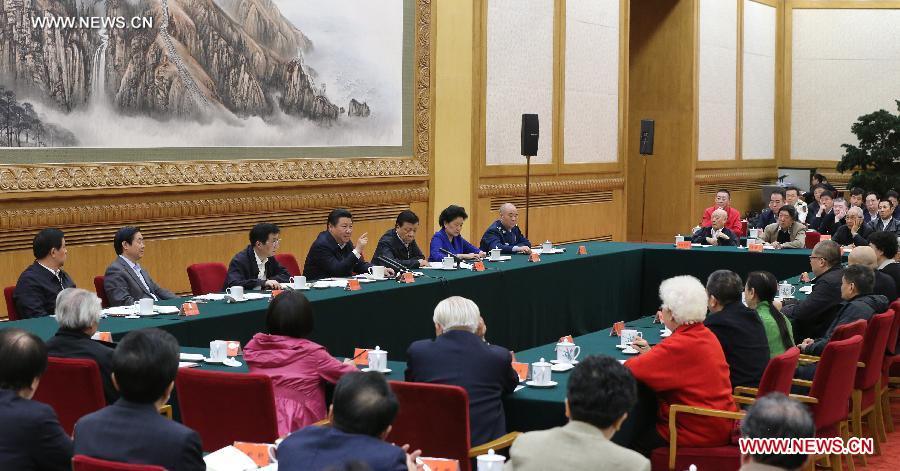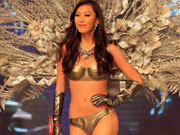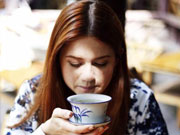 |
| Chinese President Xi Jinping presides over a symposium that gathered some of the country's most renowned authors, actors, scriptwriters and dancers in Beijing, capital of China, Oct. 15, 2014. (Xinhua/Ding Lin) |
BEIJING, Oct. 15 -- Chinese President Xi Jinping told artists on Wednesday that they should not pursue commercial success at the expense of producing work with artistic and moral value.
Addressing authors, actors, script writers and dancers at a symposium in Beijing, Xi urged artists to create more works that are both artistically outstanding and morally inspiring, in order to serve the people and socialism and to present socialist core values.
Artists should not "lose themselves in the tide of market economy nor go astray while answering the question of whom to serve, otherwise their works will lack vitality," he said.
Art works should not be the "slaves" of the market and should not bear "the stench of money."
Calling art and culture an indispensable contributor to the Chinese dream of national rejuvenation, the president said Chinese artists have produced many good works since the country's reform and opening-up drive, but warned that problems such as plagiarism and unoriginality still remain.
He said the status-quo of "quantity over quality" in art has created "a plateau without summits" and led to a cookie-cutter approach in production and consumption.
"Popularity should not necessitate vulgarity and hope should not entail covetousness," Xi said. "Pure sensual entertainment does not equate to spiritual elation."
He urged artists to create more works that have "bones, morality and warmth" -- meaning works that advocate integrity, merits and compassion -- in order to provide the public the best "food for thought" available.
Artists should be innovative and put the social benefits of their works before everything else, Xi said, adding that good art is intellectually and artistically successful as well as popular among the public.
"The true value of a masterpiece lies in its intellectual depth, artistic exquisiteness and skillful production," the president said, calling on Chinese artists to produce more works that "disseminate contemporary Chinese values, embody Chinese traditional culture and reflect Chinese people's aesthetic pursuit."
Academic and artistic democracy should also be promoted to allow for full discussions between groups holding different views, Xi said.
SERVING PEOPLE AND SOCIALISM
Watched by senior Communist Party of China (CPC) leader Liu Yunshan, President Xi said cultural and artistic sectors in China must serve the people and socialism.
"Socialist culture and art is, in essence, the culture and art of the people," he said, adding that serving the people and the socialist cause is a requirement of the CPC, and it is essential to the future development of the country's cultural and artistic sectors.
He described common citizens as "the connoisseurs and critics" of art, and said they should also be regarded as the main subjects of artistic works.
As quality of life has improved for the population of China, Chinese are in need of better cultural products, according to Xi, who urged the country's artists to learn from the people and base their creations on real lives.
"The creation of art can fly with the wings of imagination, but make sure art workers tread on solid earth," he said.
This is not the first time that the CPC had asked art workers to focus on the people.
Dring a famous speech on literature and art in 1942, late Chinese leader Mao Zedong said the working class should be considered as the major audience and their lives should be reflected.
According to Wang Yukai, professor with the Chinese Academy of Governance, the Chinese people enjoy more rights as the country has bestowed more power on them than ever. But "the great era will only be showcased by creating more excellent art works that reflect people's lives."
In line with the people-oriented concept to govern the country, Xi's speech also put people's interests in first place, and the idea is expanding to every aspect of life, Wang said.
PRESENTING SOCIALIST VALUES
Socialist values should be another key theme in Chinese art production, according to Xi.
"Fine art works should be like sunshine from blue sky and breeze in spring that will inspire minds, warm hearts, cultivate taste and clean up undesirable work styles," the president said.
Life-like works should be created so as to tell people in an "covert but influential" way what should be praised and what should be denied, he said.
Art works should also present patriotism as the main theme and foster correct viewpoints of history, nationality and culture, as well as strengthen pride in being Chinese, according to the president.
Xi said that "pursuit of the true, the good and the beautiful" is the mission of artists as the best works of art "touch people, baptize their soul and enable them to find beauty in nature, life and their minds."
This can "lead people to live a life abiding by the code of morality," he said.
Xi noted that traditional Chinese culture is the lifeblood of China and an important source of socialist core values, as well as "a foundation for China to compete in the world."
Artists were also urged to learn from outstanding art worldwide.
"Chinese art will further develop only when we make foreign things serve China, and bring Chinese and Western arts together via thorough understanding," said Xi.
He urged Communist Party of China (CPC) committees to "fully implement the Party's art policy" and "select eligible cadres who have both ability and political integrity, and work well with art workers."
China should also respect artists' personality and their works, and build an environment for them to be productive, he said.
Xi also called on the CPC to use "historical, people-oriented and artistic" points of views in focusing on art criticism, so as to lead people to "tell the truth and follow the code of morality."
 |

 Shocking! Photos of Chinese fighters revealed
Shocking! Photos of Chinese fighters revealed Bikini car wash draws crowds in NW China
Bikini car wash draws crowds in NW China J-10 fighters show aerobatic stunts in smog-free sky
J-10 fighters show aerobatic stunts in smog-free sky Luxurious first classes of different airlines
Luxurious first classes of different airlines China gets first fully-equipped air ambulance
China gets first fully-equipped air ambulance Season of the fall begins
Season of the fall begins China's Su-30 fighters
China's Su-30 fighters Chinese netizens fall in love with champion swimmer Ning Zetao
Chinese netizens fall in love with champion swimmer Ning Zetao Lingerie show at 2014 Miss China
Lingerie show at 2014 Miss China 'Girlfriend' of Harry Potter visits Chengdu
'Girlfriend' of Harry Potter visits Chengdu
Day|Week|Month